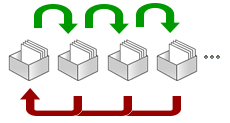
In various places I have heard people comparing the Goldlist to flash cards and saying that for them, flash cards are preferable.
I am not saying that flash cards are all wrong, certainly you can build yourself a manual SRS with paper flash cards. However, unike the Gold list they do give people the temptation to look at words they really memorised on the first day far too many times and this they create time wasting and drag on the learning process.
Even in the course of making the flash cards, if you make them yourselves, which is a job like setting up your headlist, you are making cards, and using cardboard on words, and 30% of them you memorised the first time you wrote them. So that’s a waste of paper for a start.
But the biggest negative for flash cards was brought home to me by Mike Lin on the comments on this blog on the Goldlist Method page – he says he prefers the compactness of the Goldlist to fumbling with a high pile of flash cards. That’s what got me thinking. I had exactly that problem in University trying to make enough cards to manipulate the vocab I was trying to learn.
Im Goldlist, one piece of paper has 25 words going through various stages of distillation. A single notebook just 2 cm thick can contain a headlist of 5,000 words going through the system. Let’s consider how thick a flashcard system would be that had 5000 words in it – each piece of card is about double the thickness of a page of writing paper in a book, so if a number of words written 25 per page half as thick is 2 cm deep, the pile of flash cards doing the same would be about a metre high! A 15,000 word challenge containing three bronze books and a silver book needs 8cm of shelf space, whereas flash cards would need 3 metres! You wouldn’t fit it in most rooms, you’d have to lay it on its side. Which is just as well, because of it fell over or got blown by the wind the time you’d need just putting it back together again would be another big waste. Along with the money spent on buying all that card.
I understand about the need to replenish the carbon sink, so maybe I shouldn’t be so discouraging to these flash card fans, but really – if you intend to do a big language learning project then just do the maths. Linguists who can count too will almost certainly agree that the goldlist is a far more efficient and manageable manual system than flash cards. If you just want to learn 500, then it’s not such a big deal, but still you’ll get there in less total time applied with the Goldlist method.
Related articles
- Math Practice Flashcards for Android Phones (freetech4teachers.com)
- Origami ABC Flash Card Helps Children Lean Their Letters (prweb.com)
- SAS Flashcards (appsintheclassroom.com)
- Making Flash Cards Will Improve Your MBE Score! (barexamguru.com)

A friend of mine who studied Chinese told me that he used flashcards, and they worked so well for him – until there were too many of them to handle, of course, at which point he stopped studying them at all. With the advent of electronic SRS programs like Anki, it’s a lot easier, but one big thing that puts me off about it, is that it’s so boring compared to goldlisting, and that if you neglect it for a couple of days, the reviews pile up. The goldlist, by contrast, lies there patiently until you return to it, exactly the way you left it.
The best computer based flash card system I have ever seen is ReadTheKanji.com and it would be great if they could apply their know-how to creating a Chinese equivalent as well.
You have overlooked the fact that the goldlist books are much more aesthetically pleasing, snuggled between textbooks,dictionaries etc, on your bookshelf than piles of of flashcards.
That’s very true.